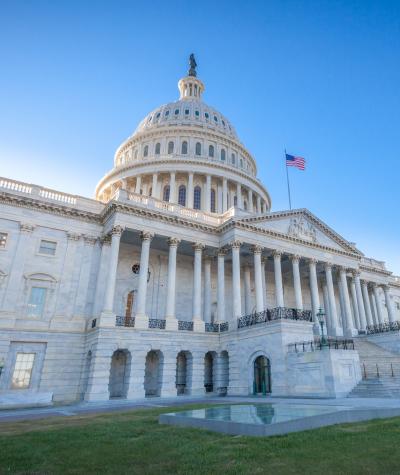The 2024 presidential election did not end in the early hours of November 6, when major news networks called the race for President-elect Donald Trump. Instead, the full process actually ended on January 6, when Congress officially counted each state’s electoral votes.
Our democracy includes a comprehensive set of checks and balances to ensure all votes are counted and election results are honored. This helps protect the peaceful transfer of power, where outgoing leaders and their allies accept the will of the voters no matter their own political preferences.
For presidential elections, we have clear rules for the casting and counting of electoral votes. The final step is for Congress to meet in a joint session on January 6 following the election, during which lawmakers tally the results and declare the winner.
Read CLC’s report on Electing the President: from Election Day to the Joint Session
Following the 2020 election, this joint session was disrupted by a violent attack on the U.S. Capitol, which was itself triggered by bad actors who sought to exploit loopholes and ambiguities in the law to undermine the election’s results and subvert the will of the people.
In response, and to strengthen the safeguards in our laws, Congress took bipartisan action and passed the Electoral Count Reform Act of 2022 (ECRA). The ECRA updated the procedures for finalizing presidential elections, including the rules for the January 6 joint session of Congress.
The ECRA specifically made clear that the vice president — who presides over the joint session under the 12th Amendment as the president of the Senate — has no power to decide or alter election results. The ECRA also strictly limited members of Congress’ ability to second-guess each state’s certified electoral votes.
Vice President Kamala Harris presided over a joint session of the 119th Congress to count each state’s electoral votes in the 2024 presidential election. This was the first joint session that used the ECRA’s updated rules, and, under those rules, everything went off without a hitch.
It is important to be clear about how that happened.
Vice President Harris was a candidate in the 2024 election, and she lost to President-elect Trump. Despite that loss, she presided over the joint session in a ministerial role consistent with the peaceful transfer of power. Her allies in Congress similarly accepted the results. Each state’s electoral votes were counted without objection, and Donald Trump was declared the winner.
In addition to an uneventful joint session to count the electoral votes, the states did their job to timely certify their elections by the ECRA’s deadline. Kansas was the lone exception, with that state’s certificate of ascertainment issued on December 12, 2024, the day after the ECRA deadline.
To be clear, no state should miss this important deadline. But in this instance — where Kansas appears to have made a ministerial error and there is no question about the outcome or legality of the appointment of Kansas’s electors — Congress did its duty and without objection counted Kansas’s votes.
The January 6 joint session happened not only because of Vice President’s Harris’ actions — though she is to be commended for accepting her defeat in a free and fair election — or because the Republican Party now has majorities in both chambers of Congress.
This happened because the Constitution and the ECRA are absolutely clear: The will of the voters determines the outcome. No vice president has the power to change election results, and Congress must accept the outcome no matter any lawmaker’s individual political preferences.
These events reflect how many previous joint sessions have looked and what we should expect in the future: The joint session is a formality where Congress merely counts the states’ electoral votes, and just another step in the peaceful transfer of power.
Campaign Legal Center (CLC) was proud to support the ECRA’s passage, and we will continue our work to uphold the values behind this important law in the years ahead. We will fight to ensure that our elections remain free and fair, so that every voice can be heard, and every vote is counted.




